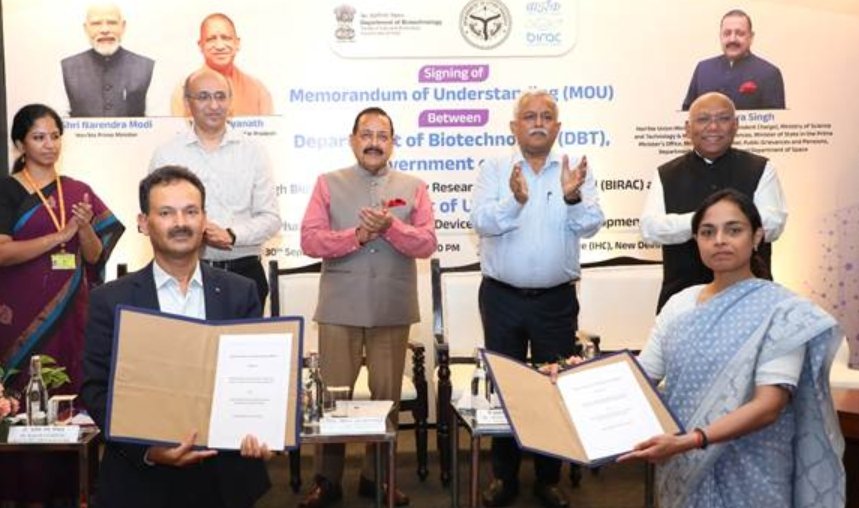Supporting Biotech Education
September 14, 2005 | Wednesday | News
Supporting Biotech Education
Supporting Biotech Education
Earlier, the steep cost of higher education, especially
outside India, was a deterrent for many meritorious students. But the easy
availability of educational loans has put the best of education virtually within
everyone's reach.
Higher studies in the cuttingedge area of biotechnology is
the dream of many students. Getting a foreign degree in biotechnology or for
that matter any other course often boils down to the issue of money. Though
financial aid is an important factor to consider, the cost of the program should
not hold a student back. Banks now offer a range of loan products and
specialized packages that can help them get by without financially burdening
their parents.
Higher education abroad
The cost of studying abroad is significantly higher than in
India and finances require research and careful planning. The cost of education
and living varies from country to country. For instance, education in the US or
UK is, in general, more expensive than in Canada or Australia. And the
university funding is easier to get in the United States than in the UK, Canada,
Australia or New Zealand. Most students who go to Australia and the UK are self
funded students. Further, even within the country, as in the US, there are
substantial differences in costs, depending on whether the university is a
public or a private one and again the location of the university. Costs also
depend on the type and duration of the program.
Generally scholarships at the undergraduate level are not
easy to come by. In the absence of scholarships, banks come to the rescue of
students as the foreign nationals are required to show proof of sufficient funds
to cover at least the first year of their college education to apply for a
student visa. Students can avail loans for study at almost any university, as
banks generally check with the respective high commissions who have an
accredited list of universities with them before sanctioning the loan. The time
period for sanctioning the loan could be between 15-30 days. This should be kept
in mind, as it is essential to have all financial documents in place when
applying for the visa.
Banks can also issue the capability certificate for students
going abroad for higher studies since some of the foreign universities require
the students to submit a certificate from their bankers about the sponsors
solvency/financial capability, so as to ensure that the sponsors of the students
going abroad for higher studies are capable of meeting the expenses till
completion of studies.
Increasing awareness
In the banking sector, officials agree that since the past
4-5 years there has been a big offtake of educational loans. This trend has been
fueled by changing mindset of the service class, which is opting to send their
children abroad for higher education and the many upcoming private institutes,
which offer more industry friendly courses albeit with a steep fee structure in
the country. Although, presently most of such courses are in the engineering and
management domain and very few in the life sciences segment. Experts feel that
the growth in the educational loan sector has been about 100 percent though the
volumes are still small. During the past year, the State Bank of India disbursed
Rs 20-25 crore as educational loans in Delhi, whereas the total loan disbursed
in Delhi in this segment by all banks was about Rs 50 crore. It is estimated
that a total of Rs 200 crore was disbursed as educational loan in the country
during the past year. Presently only about 0.5 percent of the student community
is availing the loan facility from all the banks put together.
Although in the life sciences segment no particular trend for
availing financial aid has been noted as yet, it likely to change as the
industry matures.
Eligibility criteria
Most of the public sector banks like the Andhra Bank, Bank of
India, Bank of Maharashtra, Canara Bank, State Bank of India, Syndicate Bank,
among others and some of the private banks like HSBC offer educational loan
schemes. It is the public sector banks that are bullish in this segment as they
envisage playing an important role in developing this market. Their aim is to
build a strong relationship with the younger generation and have them as their
customers in the long term. Senior bank officials advice the students to do the
necessary spade work before finalizing a course, regarding its suitability,
placement opportunities before availing a loan.
However, the banks do not give these loans to everyone who
applies for them. The first condition is that admission to
professional/technical courses should be through an entrance test/selection
process and the admission should be confirmed. Loans are not given for
correspondence courses. And the past academic record of the loan seeker, if any
should also be satisfactory. Anyone who fulfils these conditions is eligible for
an educational loan which finances a range of expenses, apart from tuition fees,
like: hostel, examination, library, laboratory fee; purchase of books,
equipment, instruments, uniforms; caution deposit, building fund, refundable
deposit supported by institution bills, receipt; travel expenses for studies
abroad; purchase of computers essential for completion of the course; and any
other expense required towards the completion of the course such as study tours,
project work, thesis, etc.
Most graduate, post-graduate, professional courses
(engineering, medical, veterinary, law, dental, management), and courses
recognized by the University Grants Commission, the All India Council for
Technical Education, and the Indian Council for Medical Research are eligible
for loans. Most banks offer a maximum of Rs 7.5 lakh for courses within India
and Rs 15 lakh for courses abroad. However, based on the nature of the course
and the needs of the applicant, individual banks offer a higher amount on a
case-to-case basis. For example, the State Bank of India (SBI) offers a maximum
loan of Rs 15 lakh for courses in India and Rs 20 lakh for studies abroad, while
HSBC Bank is one of the few banks, which provides loans of upto Rs 25 lakh.
Collateral
With a view to encourage higher education and popularize
study loans there is no security deposit for a loan sum of upto Rs 4 lakh.
Generally for loans between Rs 4.0- 7.5 lakh, there is a requirement of a third
party guarantee and no further tangible security is required. However, during
the pre sanction survey the financial credentials, like the proof of income,
bank account statements, income tax returns of the guarantor are verified. For a
sum exceeding Rs 7.5 lakh, a collateral security for the full/suitable value of
the loan in the form of mortgage of property, house, bonds, securities, etc is
mandatory.
The margin requirements on educational loans are not very
rigid. It is 5 percent for studies in India and 15 percent for studies abroad
for amounts exceeding Rs 4 lakh. The scholarship/assistantship promised to the
students is included in margin. The margin money is calculated from time-to-time
on the outstanding balance of the loan. This is brought on a year-to-year basis,
as and when the disbursements are made on a pro-rata basis.
Disbursement process
After the mark-sheets, proof of selection/admission and
scholarship to the course in question are shown to the bank officials and the
amount of loan required, other sources of funding, collateral requirement and
job prospects after the completion of the course are discussed, the completed
loan application form along with the supporting documents is submitted.
Generally, both the student and the parent/guardian act as co-applicants for the
loan. The parent or guardian of the student, is required to furnish his bank
account statement, tax returns of the last two years, statement of assets and
liabilities and proof of income. If the bank decides to sanction the loan, then
there a pre sanction survey, where the authenticity of the documents submitted,
financial credentials of the co-borrower and guarantor are verified. Most of the
banks take just about 5 days to a week to sanction a loan after the submission
of all the relevant documents. Both the student and the guardian execute the
loan document, while it is disbursed in stages as per the requirement directly
to the institutions/vendors of books/equipment/ instruments. The banks do not
charge a processing fee or upfront charges, although the State Bank of India
requires a deposit of Rs 5,000 for education loan for studies abroad, which is
adjusted in the margin
money.
Repayment terms
The repayment period is normally five to seven years. The
repayment commences one year after the completion of the course or six months
after securing a job, which ever happens earlier. This is known as the
moratorium period. During this period, simple interest is computed. On
commencement of the repayment, interest is charged on the total outstanding
balance (principal plus accrued interest) in the loan account. Accrued interest
gets added to the principal amount and Equated Monthly Instalments (EMIs) are
fixed on the total outstanding amount. However, a one percent interest
concession may be provided if the interest is serviced during the study period
when repayment holiday is on.
The interest rates on these loans are usually on a floating
basis. They are linked to the lending rates of the bank and are called PLR or
Prime Lending Rate. While lending higher sums of money normally the banks charge
one percent more than the existing PLR rate. Presently, most of the banks
provide loan at the rate of 10.5 percent interest upto Rs 7.5 lakh and 11.5
percent interest on amounts more than that.
In the case of non-repayment, a penal interest at the rate of
2 percent is charged for the overdue amount and the overdue period. Where as, if
due to some reason, the student is not able to complete the course within the
scheduled time, an extension of 1-2 years, based on the discretion of the bank
given to the student. While pursuing the course, the bank tracks the academic
performance of the student and they are required to submit their result sheets
to the bank every year.
Unlike other loans, education loans do not attract
pre-payment penalty. The student can pay off the entire outstanding loan amount
before the closure of the tenure too.
Special packages
In many cases banks also tie-up with educational institutes
to offer comprehensive loan packages to students. This saves students some of
the procedural hassles involved with getting the loan sanctioned.
The State Bank of India has a special "SBI Scholar"
scheme through which it offers in 50 identified institutes across the country
like all the Indian Institute of Technology, Indian Institute of foreign Trade,
Delhi College of Engineering, The All India Institute of Medical Sciences,
Indian Institutes of Management direct loans to the students without the
involvement of a co-borrower. Similarly the HSBC has tied up with the Indian
School of Business.
Allahabad Bank offers loans at interest rates, which are 200
basis points lower than the PLR for students of IIMs, IITs and professional
courses.
For those looking to study abroad, SBI has a special scheme
as it has tie-up with Thomas Cook. Thus along with the loan, one can get instant
wire transfers, foreign currency drafts, travellers' cheques, and insurance.
Thus banks are working as active partners with students to
help them realize their dreams and make the road to success a little smoother
for them.
Rolly Dureha










